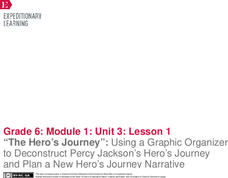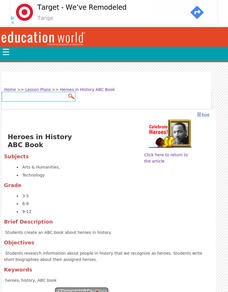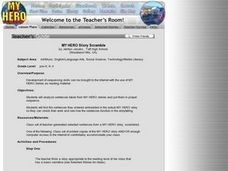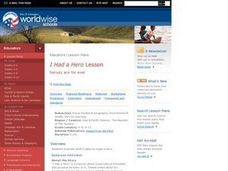Houghton Mifflin Harcourt
Heroes: English Language Development Lessons (Theme 5)
This packet of support materials for the Houghton Mifflin Harcourt thematic units on heroes, contains lessons, exercises, and activities specifically designed for ELD/ESL learners.
Maryland Department of Education
The Concept of Diversity in World Literature Lesson 5: The Tragic Hero
Should identifying a tragic hero be based on a universal definition or a definition based on the morals and values of a specific culture? As part of a study of Things Fall Apart, class members read Sylvia Plath's "Colossus" and then...
National Endowment for the Humanities
A “New English” in Chinua Achebe’s “Things Fall Apart”: A Common Core Exemplar
To examine the “New English” Chinua Achebe uses in Things Fall Apart, readers complete a series of worksheets that ask them to examine similes, proverbs, and African folktales contained in the novel. Individuals explain the meaning...
Prestwick House
Star Wars and the Hero's Journey
Is Luke Skywalker the archetype of a literary hero? Follow the path of the Hero's Journey with an engaging lesson that details the plot structure, applies it to Star Wars: A New Hope, and invites class members to choose their own example...
EngageNY
“The Hero’s Journey”: Using a Graphic Organizer to Deconstruct Percy Jackson’s Hero’s Journey and Plan a New Hero’s Journey Narrative
Time to go on a journey! Using a graphic organizer, scholars deconstruct Percy Jackson's hero's journey from the Rick Riordan novel, The Lightning Thief. Next, they begin planning their own hero's journey narrative, creating a profile of...
National Endowment for the Humanities
Elements of the Epic Hero Cycle
Here's a handy learning exercise applicable to any study of epic heroes, including those in epic poetry. Readers record examples from their text that identify the quest, the tests, helpers and companions, as well as the low point, the...
Curated OER
Understanding Protagonists and Antagonists
How can you tell if a character is a villain? What about a hero? Work on literary analysis with an engaging language arts worksheet. After completing an activity about the four types of conflict, learners fill out a character map about a...
Curated OER
Lesson: Heroes: Then and Now
What is the difference between Hercules and Spiderman? Both are heroes, right? Kids identify the characteristics that make a hero, and analyze the differences between heroes of long ago and today. They write creative stories describing a...
Curated OER
Comparing and Contrasting Heroes
Here is a language arts lesson plan that can be used with virtually any grade level. The only thing that changes is the reading level of the books. Learners compare and contrast different heroes and the characteristics they hold. They...
Curated OER
Heroes in History - ABC Book
Youngsters research information about people in history that we recognize as heroes. They write short biographies about their assigned heroes, and create an ABC book. This is an ambitious project becausev26 people must be chosen and...
Curated OER
My Hero Story Scramble
Use websites to read stories about heroes. The "My Hero" website provides skills and reading materials to help your class analyze sequence and story parts. They put the events in order to show the correct sequence of events.
Curated OER
Melba Pattillo and Ruby Bridges: Two Heroes of School Integration
Learners put themselves in the shoes of students who integrated Little Rock High School in 1957-58. Note: The primary resources in this activity provide powerful and poignant descriptions of what those students faced.
EngageNY
“The Hero’s Journey”: Analyzing a Model Narrative and Continuing to Plan a New Hero’s Journey Narrative
Many elements go into an engaging narrative story. Using a helpful resource, scholars analyze a model narrative and deconstruct it using a graphic organizer. Next, they apply their learning from the model to update their plans for their...
EngageNY
Mid-Unit Assessment and Establishing a Context for My Hero’s Journey Narrative
How do writers engage their readers in a story? Pupils consider the question and use the informational text, "The Hero's Journey" to justify their plan for their own fictional narrative. To that end, scholars write an explanatory...
K12 Reader
My Hero
Who do the kids in your class look up to? Have them describe their heroes with a writing prompt. The prompt encourages kids to explain why this person is important to them, and what actions the hero has done that make him or her a...
EngageNY
Writing: Analyzing the Conclusion of “The Golden Key” and Drafting a Compelling Conclusion for the Hero’s Journey Narrative
There's something different here. Using a note-catcher, scholars determine the differences between the conclusion of a piece of analytical writing and the conclusion of a narrative. Next, they begin drafting their own narrative...
EngageNY
End of Unit Assessment: Final Draft of Hero’s Journey Narrative
All journeys must come to an end. Using the final activity in the series, pupils analyze a model narrative for use of transitional words and phrases. Next, they apply their learning to their final drafts of their hero's journey narrative.
EngageNY
Writing to Show, Not Tell: Dialogue, Sensory Words, and Strong Action Verbs
Consume, gobble, devour ... serving up strong verbs! Writers focus on using dialogue, strong action verbs, and sensory details in their writing. After analyzing a model narrative, they apply their learning to their own hero's journey...
Curated OER
Identifying Supporting Evidence from a Text - What is a Hero?
Pupils define hero and identify supporting evidence in a text. They complete a hero diagram worksheet and watch a video about a little boy from China who acts as a hero. Additionally, they complete the Ping Hero evidence worksheet and...
Curated OER
I Had a Hero Lesson
Students read "I Had a Hero" a memoir written by a Peace Corps volunteer serving in the Democratic Republic of Congo. They discuss the story, respond to it in writing, complete comprehension activities and relate the account to their own...
Curated OER
Courage: Hero Traits
What does it mean to be a hero? Who qualifies as a hero? In groups, middle and high schoolers brainstorm a list of heroes and create a list of characteristics that a person must possess in order to be a hero. Extend this instructional...
Houghton Mifflin Harcourt
Heroes: Extra Support Lessons (Theme 5)
This 32-page packet, designed for the Houghton Mifflin Harcourt thematic units on heroes, provides activities and exercises for those learners who need extra support to master the basic concepts in the units.
Houghton Mifflin Harcourt
Heroes: Challenge Activities (Theme 5)
Dr. Martin Luther King, Gloria Estefan, Lou Gehrig. A biography, a civil rights quilt, inspiration poetry. This packet of support materials for the Houghton Mifflin Harcourt thematic units on heroes, contains enrichment activities...
EngageNY
The Hero’s Journey, Part 1: What is a Hero?
That was heroic! Scholars quickly look over What is a Hero to determine and discuss the structure of the text. They then read the introduction and Act 1 closely to find the gist and annotate the text. They circle unfamiliar words and...

























